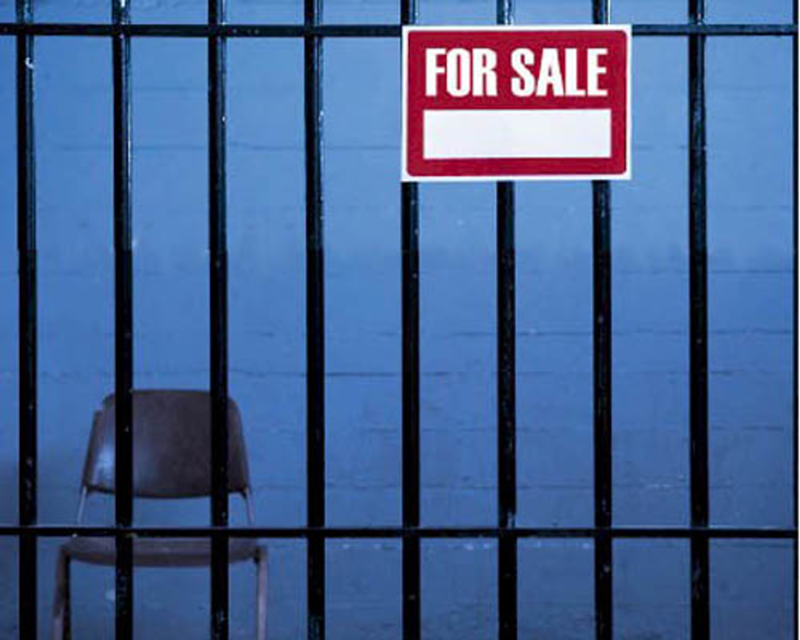There are certain institutions in the U.S. that we don't like to think of as strictly profit-seeking endeavors. It can be difficult to swallow that (supposedly) do-good establishments like retirement homes, textbook companies and hospitals exist to bring in revenue rather than serve the needs of a community without waiver. In Ohio, one state prison is already that — a business — and others could soon follow suit.
In September of 2011, Ohio became the first state in the nation to sell a state prison facility to a private prison company when the Lake Erie Correctional Institute in Ashtabula County was sold to the Corrections Corporation of America, the nation's largest prison operator, for $72.7 million.
The idea to privatize Ohio prisons was concocted by Gov. John Kasich in an attempt to fill an $8 billion hole in Ohio's budget. The sale brought in an extra $50 million to use in balancing Ohio's prison budget.
Kasich's budget strategy included an overhaul of Ohio's Department of Rehabilitation and Correction, which means that private prison facility owners would actually benefit from more incarcerations. Now, CCA has made an offerto 48 U.S. states to buy and privatize state prisons. The offer, the Corrections Investment Initiative, outlines CCA's plan to spend up to $250 million on state, local and federal entities and then manage the facilities. According to the CCA's statement from Harley Lappin, Chief Corrections Officer at CCA, they're only interested in buying facilities that are willing to sign over rights of ownership to the CCA for a minimum of 20 years, and states must agree to keep the facilities at least 90 percent full.
With six million Americans in the corrections system, the U.S. already has the highest rates of incarceration in the world — including per capita and in absolute terms — surpassing countries like Iran, China and Russia. CCA'S website glorifies its mission as noble; a video on the home page shows a patriotic, proudly waving flag. Text touts its strategies as forward-thinking and altruistic, noting that they are "protecting public safety, employing the best people in solid careers, rehabilitating inmates, giving back to communities, and bringing innovative security to government corrections."
The ACLU of Ohio has issued a statement strongly opposing the change; it argues that privatizing state prisons will add debt to state budges, hurt public safety and lead to more unnecessary incarcerations. According to "Prisons for Profit: A Look at Prison Privatization," a report published by ACLU-Ohio, privately-run prisons only offer a short-term infusion of cash, not long-term savings. "Cost savings in privately run facilities [like those run by CCA] are achieved by cutting the pay of workers," says Mike Bricker, ACLU Director of Communications and Public Policy. Corrections officers in private facilities make significantly less and receive far less benefits than those in public facilities. This difference, he says, results in an astronomically higher turnover rate in private facilities. "When something bad happens, they leave," he says.
The high turnover rate makes for a consistently less experienced staff, which means officers aren't as well-prepared when a bad situation does arise. He cites an example when cutting corners came at a high price: A CCA-run Youngstown facility that opened in 1997 brought in 1,700 violent inmates from Washington, D.C. at what was supposed to be a medium-security prison. Over the course of a year, there were 16 stabbings, two murders and six escapes; the situation became such a concern to the community that Youngstown sued CCA in 1998 and the facility was shut down.
According to Brickner, the smallest incident is enough to negate the short-term revenue from privatizing prisons; when the main objective is profit, privatized prisons want to book non-violent offenders who won't be in facilities for a long period of time. That means cells become overcrowded when minor offenders could be in rehabilitation, and extremely violent detainees tend to be managed improperly.
"It is inherently wrong to allow private businesses to make a profit off the incarceration of others," said Brickner in an ACLU press release. “Our state’s prison system is bloated, and private corporations have a vested financial interest to ensure our prisons remain full. If state officials have any hope of shrinking our prison population, we must implement transformative criminal justice reform policies and reject interests that grow our prison system.”
Brickner suggests that concerned citizens contact their elected representatives to express their opposition to privatizing prisons. Read the ACLU's full report on privatizing prisons here.


